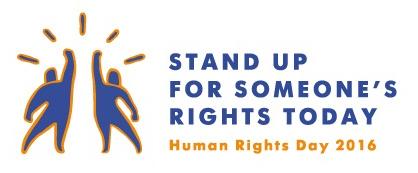
http://www.un.org/en/events/humanrightsday/background.shtml
This year, Human Rights Day calls on everyone to stand up for someone's rights! Disrespect for basic human rights continues to be wide-spread in all parts of the globe. Extremist movements subject people to horrific violence. Messages of intolerance and hatred prey on our fears. Humane values are under attack.
We must reaffirm our common humanity. Wherever we are, we can make a real difference. In the street, in school, at work, in public transport; in the voting booth, on social media.
The time for this is now. “We the peoples” can take a stand for rights. And together, we can take a stand for more humanity.
It starts with each of us. Step forward and defend the rights of a refugee or migrant, a person with disabilities, an LGBT person, a woman, a child, indigenous peoples, a minority group, or anyone else at risk of discrimination or violence.
n 1948, the adoption of the Universal Declaration of Human Rights marked a milestone in the history of human rights. For the first time, it laid out fundamental human rights for all, to be universally protected. Today, 68 years later, the Declaration remains as relevant as ever.
This year’s Human Rights Day campaign, "Stand up for someone's rights today!", is based on the Declaration's fundamental proposition that each one of us -- everywhere and at all times -- is entitled to the full range of human rights, and that it's everyone's responsibility to uphold them. Take a stand. Defend someone's rights. Human rights belong equally to each of us. They bind us together as a global community. Each one of us can make a difference.
"Where, after all, do universal human rights begin? In small places, close to home -- so close and so small that they cannot be seen on any maps of the world. [...] Unless these rights have meaning there, they have little meaning anywhere. Without concerted citizen action to uphold them close to home, we shall look in vain for progress in the larger world." -- Eleanor Roosevelt
Here are a few ways you can stand up for rights:
- Inform yourself and others about why human rights matter
- Read and share the Universal Declaration of Human Rights.
- Record the Universal Declaration of Human Rights in your native language and contribute to a collection of audio recordings to make the document more accessible.
- Make and disseminate a video of yourself with a friend talking about why you believe human rights matter (e.g. non-discrimination, gender equality or freedom of expression).
- Promote stories on your social media about people that you know have stood up for rights.
- Speak out/up when another’s rights are at risk or under attack
- If you see someone being harassed, bullied or ridiculed on the street, on public transportation, while shopping or at school, stand with them.
- Use social media to stand with people who are facing reprisals for defending human rights e.g. activists, indigenous leaders, environmentalists, lawyers, trade unionists, journalists, etc.
- At work, in school, around the dinner table, help someone whose voice is rarely heard to share their views.
- Stand with others’ human rights
- Donate to organizations that support victims of human rights abuses.
- Join public events in support of human rights - online and/or in the street.
- Volunteer with a group that promotes human rights defenders.
- Call on leaders to uphold human rights
- Lobby your government to uphold rights: sign related petitions; lobby your legislators to pass human-rights friendly laws and to repeal unfriendly ones.
- Urge your employer to sign up to the UN Global Compact and adhere to the UN Guiding Principles on Business and Human Rights; promote celebration of human rights in the work place (e.g. non discrimination, family friendly policies, decent working conditions, equal pay for equal work).
- Urge your community’s leaders (e.g. religious, local, sporting, cultural leaders) to make public commitments to human rights.
- In everyday life action
- Combat myths with facts: in online and daily conversations, challenge harmful stereotypes.
- Speak up for tolerance and against prejudice. Keep yourself in check, challenge your own views and prejudices.
- Consider the human rights track record of companies before doing your shopping.
- Talk to your children about human rights and point out positive and diverse role models.








7d88.png?itok=KI18yp23)

Add new comment